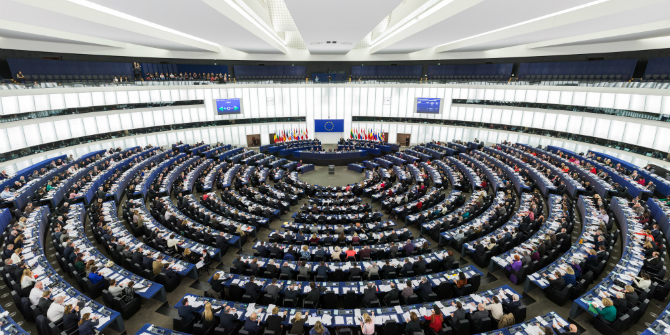 For the European Union, the exit of the United Kingdom will not only have major economic consequences, also the political fallout will be substantial. Although some observers now fear that Europe will be more dominated by Germany, such fears might be exaggerated. Steffen Hurka writes that when we examine its voting power in the European institutions the opposite may be true. Germany will lose the UK as one of its most important allies, and it may also have to face a stronger group of MEPs from the Southern member states.
For the European Union, the exit of the United Kingdom will not only have major economic consequences, also the political fallout will be substantial. Although some observers now fear that Europe will be more dominated by Germany, such fears might be exaggerated. Steffen Hurka writes that when we examine its voting power in the European institutions the opposite may be true. Germany will lose the UK as one of its most important allies, and it may also have to face a stronger group of MEPs from the Southern member states.
With Britain’s withdraw, Germany loses an important partner in the European Council and the negative consequences for Germany’s power in the European Parliament will be at least as significant. This is due to the fact that when the drafters of the Lisbon Treaty thought about the composition of the EU legislature, what they primarily had in mind were future enlargements, and not exits.
The Treaty of Lisbon stipulates that every member state of the European Union gets at least 6 and a maximum of 96 seats. Being the most populous country of the EU, Germany currently holds these 96 mandates. In addition, the Lisbon treaty maintains that the size of the European Parliament may not exceed 751 seats. This was included in order to make sure that the European Parliament does not grow out of proportion after future enlargement rounds. But what happens in the opposite case, when a country decides to leave?
At the moment, three scenarios are plausible. In the first scenario, the 73 British seats are simply dropped and not redistributed. This proceeding would be in line with the Lisbon Treaty, because the text only speaks of 751 as the maximum size of the EP, but leaves open the possibility of a smaller EP. This would constitute the most comfortable solution for Germany, but the least beneficial solution for all others, who stand to benefit from a redistribution of the British seats. Accordingly, this scenario appears rather unlikely at the moment.
In the second scenario, the EU heads of government agree to reform the Lisbon Treaty, but as things currently stand, the probability that this happens is close to zero. Therefore, the third scenario seems most likely: the British seats will be redistributed among all member states except Germany, which already possesses the maximum number of mandates. This implies that all member states would gain voting power in the European Parliament at the expense of Germany. Accordingly, this creates the paradoxical situation that the exits of one of the largest member states of the EU does not enhance the dominance of the largest member state, but weakens it.
In the European Parliament, seats are distributed according to the principle of degressive proportionality. In addition to the national upper and lower bounds of mandates and the maximum size of 751, this includes the requirement that larger member states may never receive fewer seats than smaller member states and that Members of the European Parliament (MEPs) from larger member states must represent a larger amount of citizens than MEPs from smaller member states. This helps to make sure that minorities get adequate representation. If pure proportionality were at work, after Brexit Germany would have to receive 138 mandates and Malta would get 0.7. Obviously, both is impossible.
If the 73 British seats were re-distributed among the remaining member states (except Germany) proportional to their inhabitants, especially France (+ 13), Italy (+ 12) and Spain (+9) would be the big beneficiaries of Brexit (see figure). They could claim roughly half of the British seats, also Poland (+ 8) would benefit. If we take into consideration that especially France, Italy and Spain are fierce opponents of the German (and British) austerity approach in financial matters, such a redistribution could have far-reaching consequences for future policy-making in the EU. It is likely that the gains of these member states would in the end be more modest than depicted here, because such adjustments require a unanimous vote in the European Council. Therefore, the road towards a new distribution of EP seats will likely show much of the political infighting the Lisbon provisions had sought to eradicate. In the end, Germany will likely have to accept some redistribution of voting power towards the other member states, in particular the Southern ones. Thus, Germany would not only lose the UK as one of its most important allies in the Council, it would also have to face a stronger group of MEPs from the Southern member states.
It should be highlighted that MEPs very often do not cast their votes along national, but along ideological lines. National voting cohesion is typically lower than the voting cohesion of party groups. Regarding fundamental questions of the financial architecture of the EU, however, vital national interests are at stake and these interests are likely to be visible in the European Parliament as well. It is necessary for all stakeholders to keep track of this important development, because the European Parliament has stopped being a mere talking shop a long time ago. It wields substantial powers.
This article gives the views of the author, and not the position of BrexitVote, nor of the London School of Economics. Image credit.
Steffen Hurka is a post-doctoral researcher at the Geschwister-Scholl-Institute of Political Science at LMU Munich.









It should be a chance to reduce the ridiculous size & cost of the toothless parliament rather than spread out the seats that represent British voters amongst the remaining constituents. It should be one MEP per million voters rounded up or down to the nearest million with a minimum of one MEP why should a vote in a country of next to no people be worth more than the vote of a German voter? It’s supposed to be a democratic parliament, it isn’t.